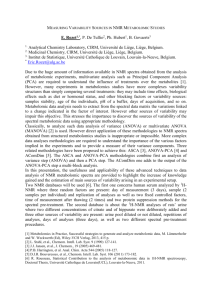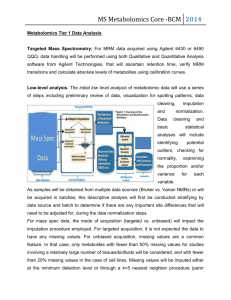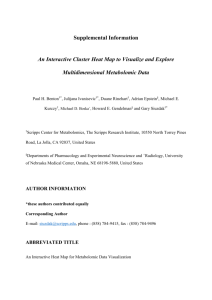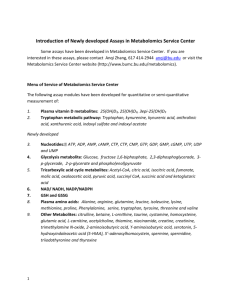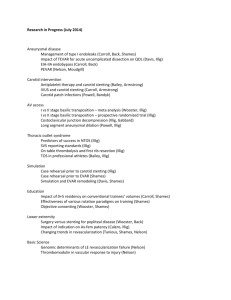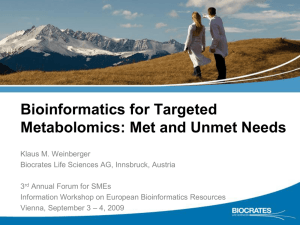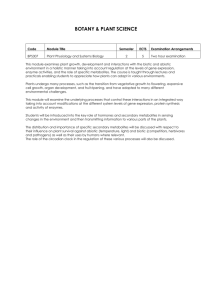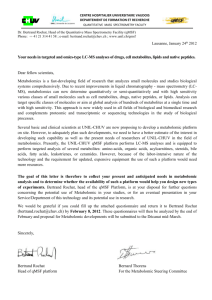1 Metabolomic Platform at HMGU metaP Jerzy Adamski Helmholtz
advertisement
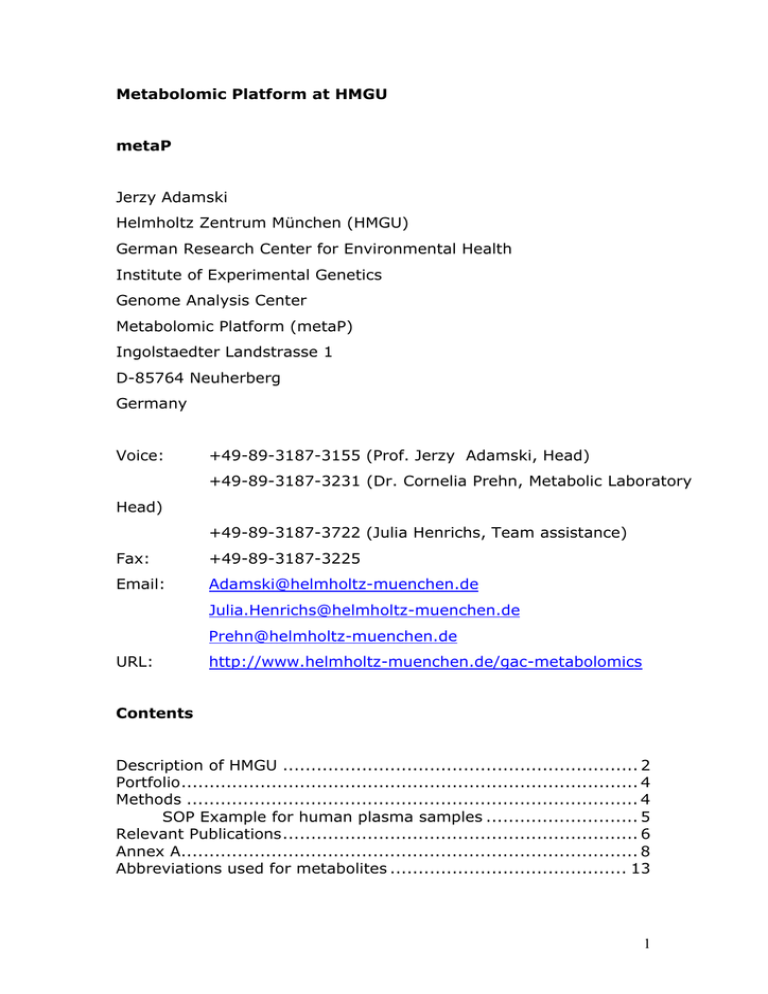
Metabolomic Platform at HMGU metaP Jerzy Adamski Helmholtz Zentrum München (HMGU) German Research Center for Environmental Health Institute of Experimental Genetics Genome Analysis Center Metabolomic Platform (metaP) Ingolstaedter Landstrasse 1 D-85764 Neuherberg Germany Voice: +49-89-3187-3155 (Prof. Jerzy Adamski, Head) +49-89-3187-3231 (Dr. Cornelia Prehn, Metabolic Laboratory Head) +49-89-3187-3722 (Julia Henrichs, Team assistance) Fax: +49-89-3187-3225 Email: Adamski@helmholtz-muenchen.de Julia.Henrichs@helmholtz-muenchen.de Prehn@helmholtz-muenchen.de URL: http://www.helmholtz-muenchen.de/gac-metabolomics Contents Description of HMGU ............................................................... 2 Portfolio................................................................................. 4 Methods ................................................................................ 4 SOP Example for human plasma samples ........................... 5 Relevant Publications............................................................... 6 Annex A................................................................................. 8 Abbreviations used for metabolites .......................................... 13 1 Description of HMGU The Helmholtz Zentrum München, National Research Center for Environmental Health (HMGU), is a federally funded research center located in Neuherberg/Munich, Germany. Multidisciplinary research of the HMGU is focused on activities related to the protection of man and his environment as well as the utilisation of scientific and technical knowledge to improve health care. Genome Analysis Center and Institute for Bioinformatics and Systems Biology (IBIS) jointly support participating laboratory (metaP, for Metabolomic Platform). It comprises experts in the biochemical, analytical and bioinformatics fields. The targeted quantitative metabomic profiling (FDA-validated kit) is based on the pioneering work by BIOCRATES Life Sciences (www.biocrates.at). We are equipped with state-of-the-art liquid handling and extraction robotics (Hamilton Microlab Star) and a high performance mass spectrometry instruments (API 4000 Q-Trap). Access to versatile post-equipment data processing is implemented. Professor Jerzy Adamski (Adamski@helmholtz-muenchen.de) is Head of Genome Analysis Center (GAC) and the Metabolomic Plattform (MetaP). The GAC promotes high throughput research in genomic, metabolomic and proteomic mechanisms of the development and progression of complex diseases in man. Several human multifactorial diseases are associated with abnormal metabolism of sterols, lipids and fatty acids. Dr. Adamskis interests are to identify the factors, both at the genomic and metabolic levels, responsible for the pathogenesis of diseases. The strategy is based on translational approaches that bridge basic research with clinical application. He participates in the EU-project PROPATH. 2 Associate Professor Thomas Illig (illig@helmholtz-muenchen.de) is Head of the group “Molecular Epidemiology” of the HMGU. He has a longstanding experience in molecular and genetic epidemiology. He is in the advisory board of the federal government for metabolic diseases. Dr. Illig co-organised large population based and disease related epidemiological studies (e.g. KORA). One main focus is the analysis of cardiovascular diseases as well as of diabetes. Dr. Illig is principle investigator of subprojects in the German National Genome Research Net. He participates in EU-projects GABRIEL and NUTRIMENTHE. Associate Professor Philippe Schmitt-Kopplin (schmitt- kopplin@helmholtz-muenchen.de) is group leader with a research focus on capillary separation techniques (CE, GC, LC) coupled to mass spectrometry, Fourier transform ion cyclotron mass spectrometry (FT/ICR-MS), multidimensional magnetic resonance spectroscopy (NMR), all applied in metabolomic studies. His research efforts are focused on the development of new and powerful research tools enabling the targeted and non targeted analysis of complex mixtures. Professor Karsten Suhre (karsten.suhre@helmholtz-muenchen.de) is Professor for Bioinformatics at the Ludwig-Maximilians-University and Head of the Department for Systematic Genome Analysis within the Institute for Bioinformatics and System Biology (IBIS) at HMGU. His personal interest is in genetically determined human metabotypes and their link to complex disease. Metabolomic studies in animal models, such as mice and bovine are used in complement to studies in a human population. He recently established MassTRIX service (http://masstrix.org) identifying chemical compounds from mass spectrometry analyses in their genomic context on KEGG pathway maps. 3 Portfolio Targeted analysis of metabolites with high throughput quantitative mass spectrometry is a new and versatile tool for comprehensive phenotype analyses of large populations. MetaP platform is designed to extensively characterize metabolic pathways affected in early-onset and late development disease. The classes of analytes include (but are not limited to) lipids, sugars, and amino acids. We quantify 163 different metabolites in human serum and animal tissue samples (metabolites are described in Annex A). The analytes give clues both to identity and cross-talk of affected pathways in early forms of diseases. Several complementary approaches are possible: (i) bridge the gap between phenotypic observations and clinical outcome by metabolomics data (ii) characterisation of the metabolic states in tissue samples from human and animal models. Methods All sample processing should follow SOP as provided from HMGU (see example below). Tissues and body fluids should be portioned and snap-frozen as soon as possible after collection. Human or animal plasma (50µL) or tissue (100mg) is requested for a single assay. Samples will be processed in a fully automated manner in multiwell plates using Hamilton robotics station. Metabolite spectrum is designed to monitor the metabolism of sugars, acylcarnitines, amino acids, glycerophospholipids and sphingolipids. The resulting dataset will be subject to several levels of data analyses, starting with metabolite identification and quantification based on the raw multiplexed MS/MS spectra and the knowledge of the spiked isotope reference markers. In this step, BIOCRATES Life Sciences MarkerIDQ™ software shall be used as provided with the AbsoluteIDQ™ kit. 4 In a second step, correlations within the metabolite dataset could be combined with external biochemical knowledge (e.g. from metabolic pathway maps, KEGG), using bioinformatics tools developed specifically for every project at HMGU-IBIS. Throughput is at present stable at 160 samples a day. SOP Example for human plasma samples (Please request the SOP for mouse plasma or other matrices) Collection and handling of plasma for metabolomics The AbsoluteIDQ™ kit has been designed for performing targeted metabolomics using plasma samples. To assure high quality results some guidelines, which are described in this section, need to be followed. Blood samples are directly collected into tubes that contain anticoagulants. The preferred anticoagulant is EDTA but also heparin is acceptable. It is not recommended to use citrate! Alternatively, blood can be drawn with a plastic syringe and is subsequently transferred into an EDTA coated tube. Immediately, the samples need to be stored on ice until centrifugation. Centrifugation should take place as soon as possible. Suitable spinning conditions would be 10 min at 2000 x g at 4°C. The resulting plasma is transferred into fresh tubes without carryover of any blood cells. Plasma samples need to be frozen in small portions (200-300 microliters) immediately and stored at -80°C until further use with the kit. 5 Relevant Publications Prehn, C., Ströhle, F., Haller, F., Keller, B., Hrabě de Angelis, M., Adamski, J. and Mindnich, R. (2007) A Comparison Of Methods For Assays Of Steroidogenic Enzymes: New GC/MS Versus HPLC And TLC. Purdue University Press, West Lafayette, Indiana, USA. Guo, K., Lukacik, P., Papagrigoriou, E., Meier, M., Lee, W.H., Adamski, J. and Oppermann, U. Characterization of Human DHRS6, an Orphan Short Chain Dehydrogenase/ Reductase Enzyme: a novel, cytosolic type 2 R-beta-hydroxybutyrate dehydrogenase. J Biol Chem, 281: 10291-10297 (2006) Herbert A, Gerry NP, McQueen MB, Heid IM, Pfeufer A, Illig T, Wichmann HE, Meitinger T, Hunter D, Hu FB, Colditz G, Hinney A, Hebebrand J, Koberwitz K, Zhu X, Cooper R, Ardlie K, Lyon H, Hirschhorn JN, Laird NM, Lenburg ME, Lange C, Christman MF.A common genetic variant 10 kb upstream of INSIG2 is associated with adult and childhood obesity. Science. 312: 279-283 (2006) Döring A, Gieger C, Mehta D, Gohlke H, Prokisch H, Coassin S, Fischer G, Henke K, Klopp N, Kronenberg F, Paulweber B, Pfeufer A, Rosskopf D, Völzke H, Illig T, Meitinger T, Wichmann HE, Meisinger C. SLC2A9 influences uric acid concentrations with pronounced sexspecific effects. Nat Genet. (2008) 2008 Apr;40(4):430-6. Chen, J., X. Zhao, R. Lehmann, J. Fritsche, P. Yin, Ph. SchmittKopplin, W. Wang, X. Lu, H.U. Häring, E. D. Schleicher, G. Xu, Strategy for biomarker discovery and identification based on LCMSn in metabonomics research. Anal. Chem. 80: 1280-89 (2008) 6 Altmaier E, Ramsay SL, Graber A, Mewes HW, Weinberger KM, Suhre K.: Bioinformatics analysis of targeted metabolomics uncovering old and new tales of diabetic mice under medication. Endocrinology (2008) 149(7):3478-89 K. Suhre, P. Schmitt-Kopplin MassTRIX: Mass TRanslator Into Pathways, Nucleic Acid Research (2008) 2008 Jul 1;36 (Web Server issue):W481-4. Gieger, Ch., L. Geistlinger, E., M. Hrabé de Angelis, F. Kronenberg, Th. Meitinger, H.-W. Mewes, H.-E. Wichmann, K.M. Weinberger, J. Adamski, Illig, T., Suhre, K. Genetics meets metabolomics: a genome-wide association study of metabolite profiles in human serum. PLOS Genetics, 2008 in press 7 Annex A: Metabolites assayed and limits of assays Acylcarnitines 1 8 Acylcarnitines 2 Amino Acids Sugars 9 Glycerophospholipids 1 10 Glycerophospholipids 2 11 Glycerophospholipids 3 Shingolipids 12 Abbreviations used for metabolites sugars Hn for nhexose, dH for desoxyhexose UA for uronic acid HNAc for N-acetylglucosamine acylcarnitines (Cx:y, where x denotes the number of carbons in the side chain and y the number of double bonds) sphingomyelins (SMx:y) sphingomyelin derivatives, such as Nhydroxyldicarboacyloylsphingosyl-phosphocholine (SM(OH,COOH)x:y) and N- hydroxylacyloylsphingosylphosphocholine (SM (OH)x:y) Glycerophospholipids are further differentiated with respect to the presence of ester (a) and ether (e) bonds in the glycerol moiety, where two letters (aa, ea, or ee) denote that the first as well as the second position of the glycerol unit are bound to a fatty acid residue, while a single letter (a or e) indicates a bond with only one fatty acid residue. E.g. PC_ea_33:1 denotes a plasmalogen phosphatidylcholine with 33 carbons in the two fatty acid side chains and a single double bond in one of them. glycero-phosphatidic acids (PA), glycero-phosphatidylcholines (PC), glycero-phosphatidylethanolamines (PE), phosphatidylglycerols (PG), glycero-phosphatidylinositols (PI) glycerophosphatidylinositol-bisphosphate (PIP2) and - triphosphate (PIP3) glycerophosphatidylserines (PS). 13
